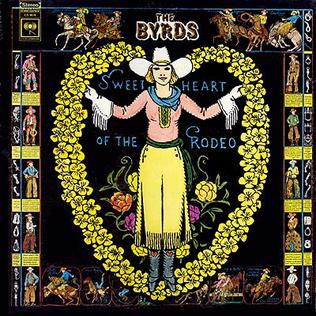 The original Byrds were now down to two: McGuinn and Hillman. Still saddled with a record contract, they regrouped with a couple of new members and some grand ideas. Instead, they followed the post-psychedelic hangover of 1968 by going back to basics. Anchored by multi-instrumentalist trust fund brat Gram Parsons, the band more or less invented country-rock with Sweetheart Of The Rodeo.
The original Byrds were now down to two: McGuinn and Hillman. Still saddled with a record contract, they regrouped with a couple of new members and some grand ideas. Instead, they followed the post-psychedelic hangover of 1968 by going back to basics. Anchored by multi-instrumentalist trust fund brat Gram Parsons, the band more or less invented country-rock with Sweetheart Of The Rodeo.
Neither veteran brought an original composition to the album, but being the Byrds, they do frame the set with two Bob Dylan songs (“You Ain’t Goin’ Nowhere” and “Nothing Was Delivered”) recently unearthed from the Basement Tapes. The rest are straight arrangements of traditional songs, bluegrass favorites and even an R&B cover, a wonderfully pretty “You Don’t Miss Your Water”. Throughout, the songs are colored by rolling piano, banjo, pedal steel guitar and not a single Rickenbacker. McGuinn still took center stage as the leader, and even without his old granny glasses he could still carry a tune—so much so that for either legal or personal reasons he overdubbed his lead vocal on a few tracks that were originally cut with Gram Parsons singing.
That Parsons guy tended to make a pretty big impression on everyone he met; supposedly he was the one who turned the Byrds ship into this particular harbor. “You’re Still On My Mind” is a good drinkin’ song, and “Life In Prison” fits the same stereotype. His best moments on the album are on his own songs; “Hickory Wind” and “One Hundred Years From Now” (even sung by McGuinn) became immediate genre classics. And although mostly relegated to bass and mandolin duties, Hillman indulges his bluegrass roots with strongly sung performances of “I Am A Pilgrim” and “Blue Canadian Rockies”.
Sweetheart Of The Rodeo was not an immediate hit, but became a touchstone once more rock musicians began incorporating country sounds into their work. Its importance in the history of the Byrds was underscored by the inclusion of the original Gram Parsons vocals on the three songs McGuinn tinkered with on the band’s 1990 box set. It’s also the only one of their albums to be given its own “deluxe” expansion past a single CD. The Legacy Edition includes the three Parsons vocals originally featured on the box set, along with the standard outtakes, a bunch of early Parsons tracks and a whole pile of rehearsal takes on a second disc, but ignores five of the bonus rehearsals on the 1997 CD, so completists have to have both.
The album does show something of a progression through their first five, and while the Byrds continued as a band for another five years, they really weren’t the same band. Only Roger McGuinn was left, and he built a new unit around the amazing speedy picking of a kid named Clarence White. There would be some definite highlights over the next handful of albums—“Ballad Of Easy Rider” and “Chestnut Mare” to name two—and they still maintained a rabid fan base, but people seeking the jingle-jangle sound of the original band would be disappointed. (Besides, David Crosby was doing pretty well with his new friends anyway.)
The Byrds Sweetheart Of The Rodeo (1968)—4
1997 CD reissue: same as 1968, plus 8 extra tracks
2003 Legacy Edition: same as 1968, plus 28 extra tracks
Love this one--trumps most of Parsons' other stuff IMO, excepting Gilded Palace of Sin, then again I've had a soft spot for country for a while!
ReplyDeleteI've heard a lot of accounts about Parsons' lead vocals all being overdubbed because of contractual reasons, but he's definitely doing lead on several of these tracks...I wonder if anybody knows the true story!
According to producer Gary Usher, the legal issues were resolved, but he wanted more of a balance between McGuinn, Hillman and Parsons on lead vocals. McGuinn was the recoginized singer of the band, so Usher wanted more vocals form him.
ReplyDelete